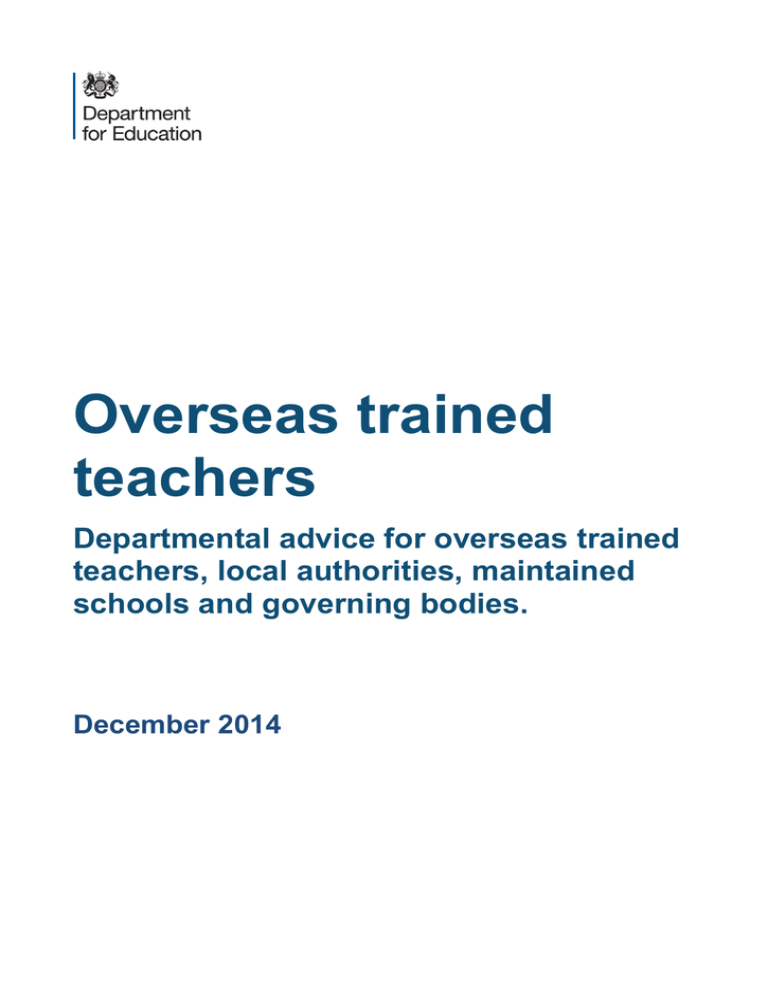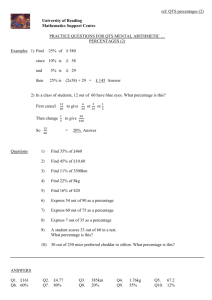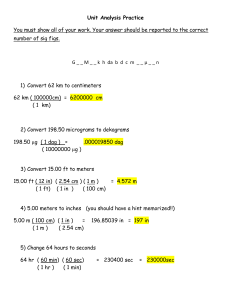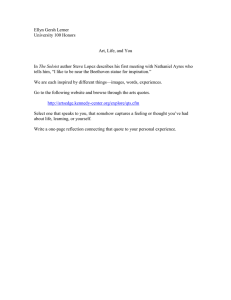Overseas-trained teachers
advertisement

Overseas trained teachers Departmental advice for overseas trained teachers, local authorities, maintained schools and governing bodies. December 2014 Contents Summary 3 About this departmental advice 3 Expiry or review date 3 Who is this advice for? 3 Main points 3 The four year rule 4 Key points 4 Advice 5 Further information 6 Useful resources and external organisations 6 Other relevant departmental advice and statutory guidance 6 Other departmental resources 6 2 Summary About this departmental advice This is non-statutory departmental advice on employing overseas-trained teachers (OTTs) to teach in state maintained and non-maintained special schools in England. In this guidance, OTTs are people who have qualified as teachers in a country outside of the European Economic Area (EEA) and Switzerland having successfully completed a course of initial teacher training which is recognised by the relevant authorities in their home countries. The Education (Specified Work and Registration) (England) Regulations 2012 (SI 2012/762), as amended by the Education (School Teachers) (Qualifications and Specified Work) (Miscellaneous Amendments) (England) Regulations 2012 (SI 2012/1736) set out the conditions under which overseas-trained teachers are allowed to carry out specified work (teach pupils). Expiry or review date This advice will be kept under review and updated as necessary. Who is this advice for? This advice is for: • Local authorities • School leaders, school staff and governing bodies in all maintained schools and non- maintained special schools in England. Main points • The Education (Specified Work) (England) Regulations 2012 allow teachers qualified in a country outside of the UK to teach in state maintained schools and non-maintained special schools in England without qualified teacher status (QTS) for up to four years. • Teachers who qualified in Canada, Australia, New Zealand and the United States of America may apply for QTS without further training or assessment in England. • Teachers from overseas may also be required to satisfy UK Visa and Immigration requirements. . 3 The four year rule OTTs may teach in state maintained schools and non-maintained special schools in England as unqualified teachers for four calendar years. This is known as the four year rule and it applies to teachers who qualified in countries outside of the EEA and Switzerland except for teachers who qualified in Australia, Canada, New Zealand and the United States of America (USA). Key points 1. An OTT is an unqualified teacher and the four year rule begins on the first day the individual taught in a state maintained school or a non-maintained special school in England and expires exactly four years later regardless of whether the OTT has taught throughout the four year period. OTTs are not permitted to teach in Pupil Referral Units until they have been awarded QTS. 2. In order to teach after four years, OTTs must have been awarded QTS. OTTs who have been awarded QTS by the end of their four year period become qualified teachers and are allowed to continue teaching subject to UK Visa and Immigration permission if required. 3. It is unlawful for OTTs to continue teaching in state maintained schools and nonmaintained special schools in England beyond four years if they have not been awarded QTS. 4. OTTs without QTS may continue teaching after four years if: • they have taken statutory maternity, paternity, adoption, parental or shared parental leave or pregnancy related absences during the four year period. In such cases, the OTT is eligible for extra time equal to the amount of statutory maternity, paternity, adoption, parental or shared parental leave taken under the Employment Rights Act 1996. For example, if a teacher has taken 34 weeks statutory maternity leave during her four year period, she is allowed an extra 34 weeks to obtain QTS; or • they are employed as an instructor (an unqualified teacher) who may fill a post to teach subjects or courses that require special qualifications and/or experience if they have skills and experience relevant to the teaching post in question. There is no generic definition of skills, qualifications and experience, which are decided by individual head-teachers based on the subject in question. An OTT should only be reclassified as an instructor if they meet this requirement. 5. From 1 April 2012 qualified teachers from Australia, Canada, New Zealand and the USA can apply to the National College for Teaching and Leadership for QTS without undertaking further training or assessment in England. If they are awarded, QTS, they are exempt from the four year rule. 4 Advice It is essential that schools, local authorities and employment agencies make OTTs aware on their appointment that there is a legal limit on the length of time they are allowed to teach without QTS. It is strongly recommended that the following action is undertaken by OTTs either before or shortly after arrival in the UK: • They arrange a check with UK NARIC to establish whether their overseas qualifications are equivalent to a UK first degree and also to a GCSE grade 'C' in mathematics and English (and science if the person is a primary teacher). It is important these checks are carried out at an early stage as some teachers may need to top up their qualifications before they can undertake QTS training and extra time is not available for this purpose. • They arrange to undertake an appropriate course leading to QTS by contacting the National College for Teaching and Leadership Teaching Information Line on 0800 3892500. 5 Further information Useful resources and external organisations UK NARIC is the national agency responsible for providing advice on qualifications worldwide: www.naric.org.uk/naric/ Other relevant departmental advice and statutory guidance Advice on applying for QTS is available at: www.gov.uk/qualified-teacher-status-qts Other departmental resources Information on courses of initial teacher training courses leading to the award of QTS are available at: www.education.gov.uk/get-into-teaching/teacher-training-options 6 © Crown copyright 2014 You may re-use this document/publication (not including logos) free of charge in any format or medium, under the terms of the Open Government Licence v2.0. Where we have identified any third party copyright information you will need to obtain permission from the copyright holders concerned. To view this licence: visit www.nationalarchives.gov.uk/doc/open-government-licence/version/2 email psi@nationalarchives.gsi.gov.uk About this publication: enquiries www.education.gov.uk/contactus download www.gov.uk/government/publications Reference: DFE-00713-2014 Follow us on Twitter: @educationgovuk Like us on Facebook: facebook.com/educationgovuk 7



